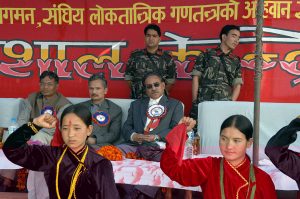Memo #218
By Peng Hwa Ang, Shyam Tekwani and Wang Guozhen -tphang [at] ntu.edu.sg , tekwanis [at] apcss.org , annegzwang [at] gmail.com
 Communication in the mountainous country of Nepal has always been difficult, until the advent of the mobile phones. Of the country’s 28.5 million residents, 46% used mobile phones in 2011, a 61% increase from the year before. So what would happen if the government decided to shut down phone service?
Communication in the mountainous country of Nepal has always been difficult, until the advent of the mobile phones. Of the country’s 28.5 million residents, 46% used mobile phones in 2011, a 61% increase from the year before. So what would happen if the government decided to shut down phone service?
In February 2005, the King ordered a shutdown of all public telecommunication links before a crackdown by the army against the Maoist insurgents. The impact on the economy was immediate. The resulting public outcry forced the government to gradually restore landlines and Internet services over the following weeks. Nevertheless, most Nepalese lost their prepaid mobile phone service, the cheapest and most common method of mobile phone subscription, for 88 days.
A study by the Singapore Internet Research Centre interviewed key players in the 2005 shutdown, including the prime minister, business owners, journalists, military and police officers from the capital Kathmandu, from the less-developed Nepalgunj municipality and nearby towns in the Terai region, and from the more developed tourist center of Pokhara. The study found that the mobile phone had become so intertwined with the lives of Nepalese that the shutdown was disruptive, traumatic and in some cases even fatal.
The president of the Nepalgunj Chamber of Commerce estimated that 75% of all business transactions in the region used mobile phones, so medium-sized and large businesses had to hire extra help to take orders and confirm delivery and payment. Smaller-scale businesspeople, such as plumbers, electricians and contractors who used the mobile phone as a “placeless place” lost a lot of business. A cardiologist reported four patients suffering fatal heart attacks because their family members could not reach him. Newspapers became thinner as reporters could not send in breaking news. Without news, people felt more anxious and insecure. There was such widespread anger at the phone shutdown that some interviewees said this contributed to the abolition of the monarchy. Although speculative, this conclusion is supported by research on similar effects related to the shutdown of communications during the 2011 uprising in Egypt.
About the Authors:
Prof. Ang Peng Hwa is Director of the Singapore Internet Research Centre at the Wee Kim Wee School of Communication and Information, Nanyang Technological University, Singapore.
Associate Professor Shyam Tekwani is Program Manager for the Comprehensive Security Responses to Terrorism course at the Asia-Pacific Center for Security Studies in Hawai’i.
Dr. Wang Guozhen is an associate professor in the School of Humanities, Zhanjiang Normal University, Guangdong, China.

Prachanda (centre) and Bhattarai (centre left), former leaders of the Maoist guerrilla movement, at a rally before they became prime minister and finance minister respectively in 2008 following the King’s abdication, photographed before an interview with the authors.
Links:
- Shutting Down the Mobile Phone and the Downfall of Nepalese Society, Economy and Politics, Pacific Affairs 85, no.3, 2012 by Peng Hwa Ang, Shyam Tekwani and Guozhen Wang
- Media Disruption Exacerbates Revolutionary Unrest: Evidence from Mubarak’s Natural Experiment (2011). APSA 2011 Annual Meeting Paper.
Related Memos:
- See our other memos on Nepal

Comments are closed, but trackbacks and pingbacks are open.